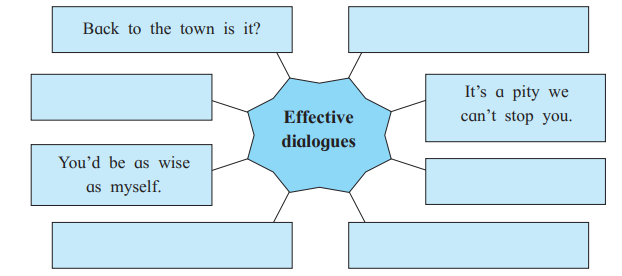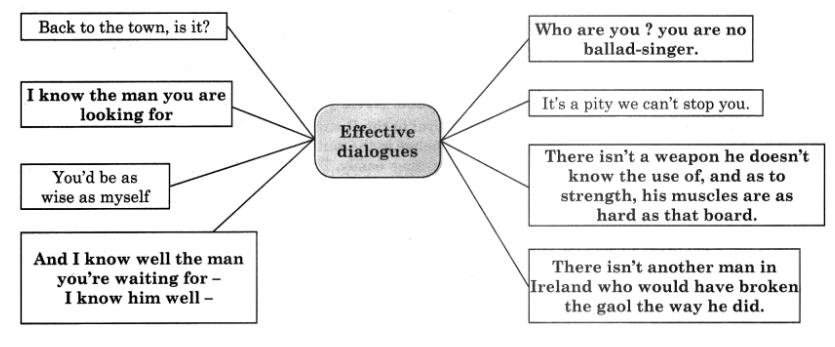The Rising of the Moon
Brainstorming – Solutions
(A1) There are some dialogues which are short, but quite effective. They give us enjoyment and add beauty to the main story. Find some more from the text.
Answer:-
(A2) Theme
(i) Comment on the given statement after reading the given dialoguea. And if we get him itself, nothing but abuse on our heads for it from the people, and maybe from our own relations
You may begin like this
We do not think about society at large
Answer:- This statement highlights the conflict faced by the policemen, particularly the Sergeant, who are torn between their duty to enforce the law and the disapproval they face from society. The dialogue suggests that capturing the fugitive would lead to criticism and hostility from the local people and even their own families, who may sympathize with the nationalist cause. It reflects the tension between official duty and personal or societal loyalties, showing that the police are alienated from the community they serve due to their role in maintaining British rule.
b. “It’s a pity some honest man not to be better of that”
This statement reflects the Sergeant’s regret that the £100 reward for capturing the fugitive will not benefit an honest man. It underscores his internal conflict between personal gain and moral integrity. The Sergeant recognizes the allure of the reward but feels it is unfortunate that such a sum is tied to capturing a man who is part of the Irish nationalist movement, hinting at his sympathy for the cause. This reveals his struggle between duty to the law and an underlying sense of fairness or loyalty to his people.
c. “I wouldn’t be in your shoes if he reward me ten times as much. People generally fall victim to incentives. Some people stick to values. They”
Answer:- This statement by the Man (the disguised fugitive) suggests that some individuals prioritize their values over material rewards, unlike others who are swayed by incentives. The Man implies that the Sergeant’s role in pursuing him is undesirable, as it involves betraying one’s own people for money. It highlights the theme of loyalty to one’s nation versus personal gain, suggesting that those who uphold values, like the fugitive’s commitment to the nationalist cause, are morally superior to those who chase rewards. The statement subtly challenges the Sergeant to reconsider his priorities.
d. “But when I saw a man in trouble, I could never help trying to set him out of it. It’s human to help others. Here the statement tells us that”
Answer:- This statement reflects the Man’s compassionate nature and his attempt to appeal to the Sergeant’s humanity. It suggests that helping someone in distress is a fundamental human instinct, transcending roles or allegiances. The Man uses this to persuade the Sergeant to empathize with him, framing himself as a person in need rather than a criminal. This underscores the theme of human connection and empathy, showing how shared cultural ties and patriotic songs can bridge the gap between the Sergeant’s duty and his personal feelings, ultimately influencing his decision to let the fugitive escape.
(ii) The priorities of the Sergeant are shifted. Complete the given table by using the given clues.
Answer:-
| Priorities of the Sergeant | Priorities at the end of the play |
|---|---|
| In the beginning | Patriotism |
| Law and duty | Sympathy for the freedom fighter / Emotional awakening |
(iii) Find sentences from the play related to the given points:
a. Loyalty in Irish Nationalism:
1. “Maybe, Sergeant, you’ll be on the side of the country yet.”
2. “I am a friend of Granuaile. There is a hundred pounds on my head.”
3. “Well, good-night, comrade, and thank you. You did me a good turn to-night.”
4. “Maybe I’ll be able to do as much for you when the small rise up and the big fall down.”
b. Tension between different loyalties:
1. “It’s little we get but abuse from the people, and no choice but to obey our orders.”
2. “Well, who knows but I might? I had a great spirit in those days.”
3. “I am in the force. I will not let you pass.”
4. “I wonder now, am I as great a fool as I think I am?”
A5) The description of the character is given below. Identify the character from the play. Find some sentences which support your choice.
(a) He is a brave but irresponsible person.
Ans: The character is the Sergeant.
- He is brave: “I don’t want it. Bring it with you.”
- He is irresponsible: Sergeant (after a pause) – “No one.” (when asked by fellow policemen if anyone passed, he lied to protect the criminal)
(b) He is a major character. He dominates in the story.
Ans: The character is the Sergeant.
- “I’ll mind this place myself.”
- “I am in the force. I will not let you pass.”
(c) He is smart as well as brave.
Ans: The character is the Ballad Singer (the escapee / freedom fighter).
- “You needn’t ask who I am; that placard will tell you.”
- “I thought to do it with my tongue.” (He used clever persuasion instead of violence to escape)
(d) He is the centre of the play.
Ans: The character is the Sergeant.
- “Well, if I was foolish then, that time’s gone.”
- “A hundred pounds reward! A hundred pounds! I wonder, now, am I as great a fool as I think I am?”
(e) He is obedient and simple.
Ans: The character is Policeman B.
- “We had no orders to go back to the station; we can stop along with you.”
- “Well, we’ll leave you the lantern anyhow.”



Leave a Reply